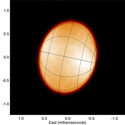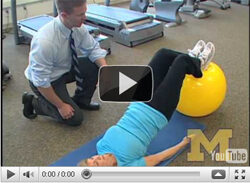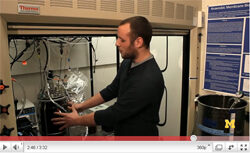Research News
-
Sinus care 101: Spring cleaning for your nose
It’s allergy season. Doctors from the Michigan Sinus Center offer tips for keeping your symptoms in check.
-
Squashed stars and a bungled theory
The hottest stars in the universe spin so fast that they get a bit squished at their poles and dimmer around their middle. A 90-year-old theory predicts the extent of this phenomenon—but a new U-M study shows that theory has major flaws. “It is surprising to me that von Zeipel’s law has been adopted in astronomy for such a long time,” says researcher Xiao Che.
-
Someone to lean on
A new program at U-M aims to help patients with depression manage their symptoms by making someone who cares about them an important part of their treatment.
-
Older and stronger
Older adults don’t have to accept the loss of strength and muscle. Even people in their 70s and 80s can build “significant strength improvement” with simple exercises.
-
'We've all been taught that this doesn't happen'
In a surprise discovery that overturns a century-old tenet of physics, U-M professor Stephen Rand and his team found that a light field can generate magnetic effects that are 100 million times stronger than previously expected. The discovery could lead to a revolution in solar power.
-
Invasive mussels causing massive ecological changes in Great Lakes
The blitzkrieg advance of two closely related species of mussels—the zebra and quagga—is stripping the lakes of their life-supporting algae, resulting in a remarkable ecological transformation and threatening the multibillion-dollar U.S. commercial and recreational Great Lakes fisheries.
-
Turning toilet water into energy and drinking water
U-M professor Lutgarde Raskin and her collaborators have developed what’s called an “anaerobic membrane bioreactor” that could make it possible to turn municipal wastewater into energy.
-
Computers that fit on a pen tip
Recent advances by U-M researchers are significant milestones in the march toward millimeter-scale computing, believed to be the next electronics frontier.
-
Mammograms from age 40 save lives
So says a U-M study that looks at whether it’s best to start regular screening at 40 or 50.










